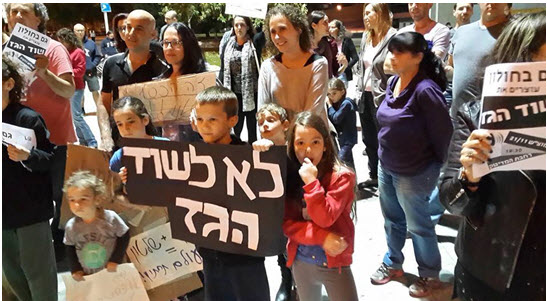A session of the Knesset’s Economic Affairs Committee held to discuss implementation of the outline for the country’s long-disputed privatized natural gas degenerated into shouting matches several times on Sunday, November 22, as Knesset members across the political spectrum and social activists disrupted each other when speaking.
The session, the first in a series of final prerequisite discussions towards implementing the long-disputed deal, became so heated that committee chairman MK Eitan Cabel began ejecting unruly participants from the meeting room. While the deal received the required approval of the neo-liberal cabinet in August, a full implementation of the outline is now conditional upon that the Minister of the Economy’s invoking a legal clause to bypass objections of the Antitrust Authority.
Following the resignation of MK Arye Deri from his role as Minister of the Economy three weeks ago, Prime Minister Benjamin Netanyahu, who in the interim is filling this post, is obliged to consult with the Economic Affairs Committee prior to activating the controversial clause – known as Article 52.
The natural gas outline is the result of some eight months of negotiations that followed former Antitrust Commissioner David Gilo’s announcement last December that he intended to review whether the market dominance of Delek Group and American multinational enterprise Noble Energy constituted an illegal “restrictive agreement.” To circumvent the authority of the Antitrust Commissioner, the Minister of the Economy can invoke Article 52 of the 1988 Restrictive Trade Practices Law (The Antitrust Law), citing national security interests. Mk Deri was not prepared to invoke Article 52, arguing that the clause had never been implemented in the country’s history.
Again, Netanyahu assumed the role of Minister of the Economy after Deri was forced to resign on November 1. While Netanyahu is required to consult with the Economic Affairs Committee prior to invoking Article 52, the committee’s recommendations are not legally binding. At the beginning of Sunday’s Economic Affairs Committee session, MK Cabel stressed that the prime minister “believes that in light of considerations of foreign policy and national security, we must in this case impair competition and grant exceptions to the gas partnership.” Cabel added: “Many others think differently and believe that real competition that will bring about an improvement in the welfare of residents is an integral part of Israel’s national security, and that foreign considerations must not prevail in the current case over considerations of competition.”
Likud MKs David Bitan and Miki Zohar – the latter of whom was later forced to leave the room – both stressed that the ensuing discussions must focus solely on Article 52 itself and not on the gas outline. MK Dov Khenin (Hadash – Joint List) argued that the committee should not exclusively consider this issue. MK Khenin argued that there has been a lack of democratic process since the beginning of the gas negotiations. “Many questions have not been answered along the way,” he said. “How is it possible that foreign companies will determine the foreign relations of Israel?” Key activist against the gas deal, Orly Barlev, backed MK Khenin and described how they had come to the Knesset to represent the wider public of tens of thousands of people across the country who demonstrated every Saturday night during the last months because of their conviction that that the gas outline is only in the interest of the companies.
Related:
- MK Khenin: Antitrust Commissioner’s Resignation – Victory for Gas Tycoons & Their Puppets in the Government
- Billionaire Adelson to Netanyahu: “Streamline Gas Industry Regulations”; Thousands Protest against Deal in Tel Aviv
- US Ambassador Presses Joint List MKs on Gas Deal Vote
- Thousands Protest Gas Deal in Tel Aviv, Jerusalem, Be’er Sheva, Kiryat Shmona, and Caesarea
- Protest in Tel Aviv against Imperialist Intervention by US in Natural Gas Deal



